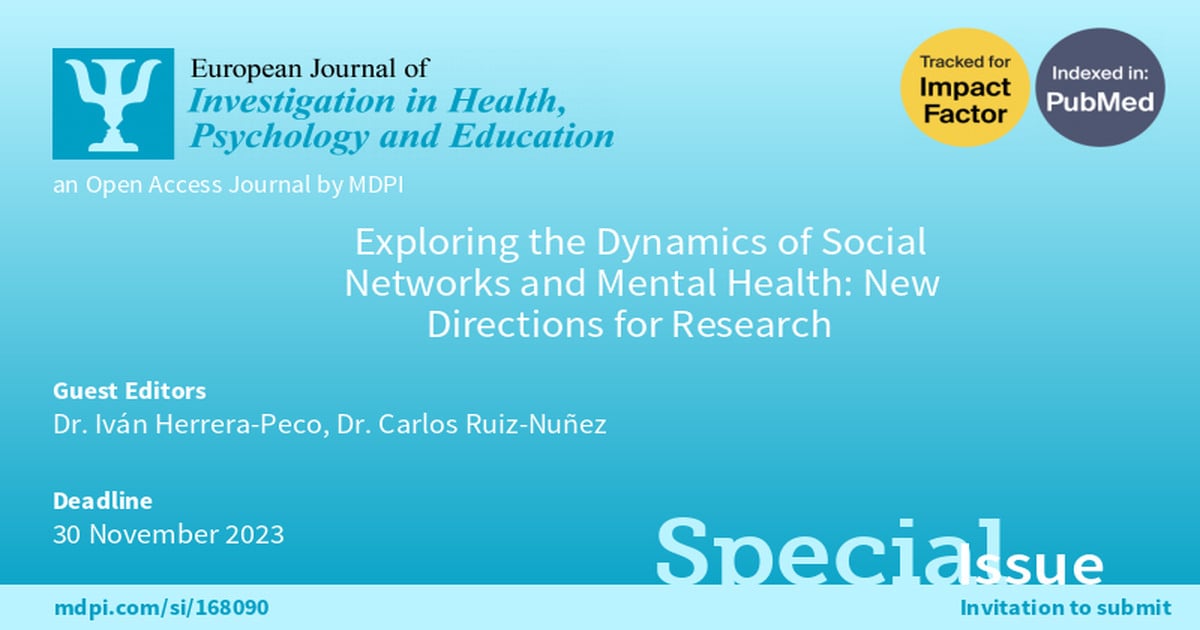- 2.6Impact Factor
- 5.1CiteScore
- 26 daysTime to First Decision
Exploring the Dynamics of Social Networks and Mental Health: New Directions for Research
Special Issue Information
Dear Colleagues,
Social networks have significantly changed the way people interact with each other, but also how they consume information and develop their entertainment. Although social networks can have some benefits, they can also have negative effects on people's mental health.
Social networks have the potential to be a useful tool for improving people's emotional wellbeing, but also for education, inspiration, and social connection. In fact, many mental health organizations and professionals use social networks to disseminate information, share resources, and offer emotional support, not to mention promoting mental health awareness.
In addition, social networks can also provide a space for creative expression and self-expression, which can be beneficial for mental health. Not to mention that they allow sharing experiences and connecting with people who are going through similar situations, finding communities of support.
However, it cannot be forgotten that there is another facet of social networks, and that is that excessive use of social networks can lead to addiction and dependence on them. In addition, social networks can increase anxiety and stress, especially when they are used to compare our life with that of others. It has also been shown that social networks can contribute to decreased self-esteem and self-image, especially in adolescents and young adults.
In summary, social networks can have both positive and negative effects on the mental health of the world's population. For this, and when they are used for information dissemination, it is important that people have access to accurate and quality information and that they know how to use social networks in a healthy and responsible way.
This is the main interest of the present Special Issue, in which all those studies focused on the potential uses of social networks to generate training activities, offer resources, or become support communities focused on mental health are of interest, but without also forgetting those studies that focus on the negative or detrimental effects of the use of social networks in the population.
Dr. Iván Herrera-Peco
Dr. Carlos Ruiz-Nuñez
Guest Editors
Manuscript Submission Information
Manuscripts should be submitted online at www.mdpi.com by registering and logging in to this website. Once you are registered, click here to go to the submission form. Manuscripts can be submitted until the deadline. All submissions that pass pre-check are peer-reviewed. Accepted papers will be published continuously in the journal (as soon as accepted) and will be listed together on the special issue website. Research articles, review articles as well as short communications are invited. For planned papers, a title and short abstract (about 250 words) can be sent to the Editorial Office for assessment.
Submitted manuscripts should not have been published previously, nor be under consideration for publication elsewhere (except conference proceedings papers). All manuscripts are thoroughly refereed through a single-blind peer-review process. A guide for authors and other relevant information for submission of manuscripts is available on the Instructions for Authors page. European Journal of Investigation in Health, Psychology and Education is an international peer-reviewed open access monthly journal published by MDPI.
Please visit the Instructions for Authors page before submitting a manuscript. The Article Processing Charge (APC) for publication in this open access journal is 1600 CHF (Swiss Francs). Submitted papers should be well formatted and use good English. Authors may use MDPI's English editing service prior to publication or during author revisions.

Benefits of Publishing in a Special Issue
- Ease of navigation: Grouping papers by topic helps scholars navigate broad scope journals more efficiently.
- Greater discoverability: Special Issues support the reach and impact of scientific research. Articles in Special Issues are more discoverable and cited more frequently.
- Expansion of research network: Special Issues facilitate connections among authors, fostering scientific collaborations.
- External promotion: Articles in Special Issues are often promoted through the journal's social media, increasing their visibility.
- e-Book format: Special Issues with more than 10 articles can be published as dedicated e-books, ensuring wide and rapid dissemination.

